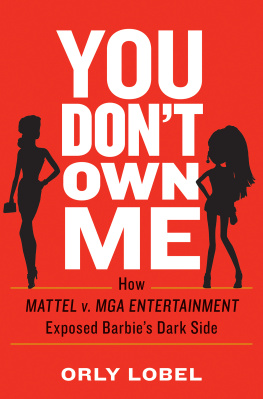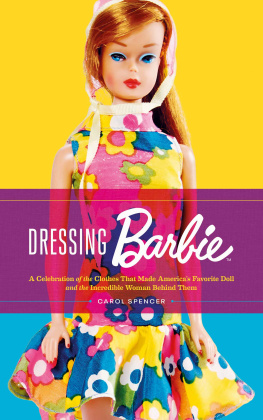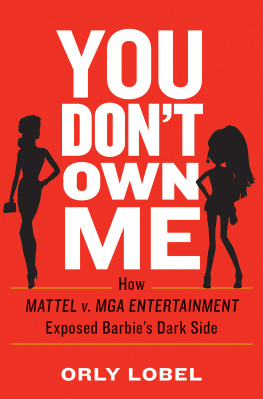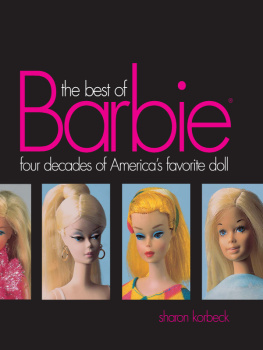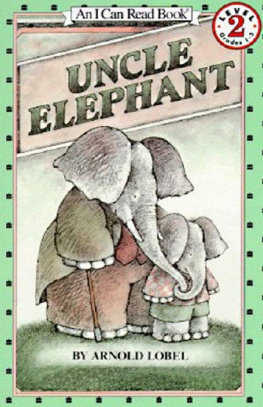Orly Lobel - You Don’t Own Me: How Mattel v. MGA Entertainment Exposed Barbie’s Dark Side
Here you can read online Orly Lobel - You Don’t Own Me: How Mattel v. MGA Entertainment Exposed Barbie’s Dark Side full text of the book (entire story) in english for free. Download pdf and epub, get meaning, cover and reviews about this ebook. year: 2017, publisher: W. W. Norton & Co., genre: Home and family. Description of the work, (preface) as well as reviews are available. Best literature library LitArk.com created for fans of good reading and offers a wide selection of genres:
Romance novel
Science fiction
Adventure
Detective
Science
History
Home and family
Prose
Art
Politics
Computer
Non-fiction
Religion
Business
Children
Humor
Choose a favorite category and find really read worthwhile books. Enjoy immersion in the world of imagination, feel the emotions of the characters or learn something new for yourself, make an fascinating discovery.
- Book:You Don’t Own Me: How Mattel v. MGA Entertainment Exposed Barbie’s Dark Side
- Author:
- Publisher:W. W. Norton & Co.
- Genre:
- Year:2017
- Rating:5 / 5
- Favourites:Add to favourites
- Your mark:
- 100
- 1
- 2
- 3
- 4
- 5
You Don’t Own Me: How Mattel v. MGA Entertainment Exposed Barbie’s Dark Side: summary, description and annotation
We offer to read an annotation, description, summary or preface (depends on what the author of the book "You Don’t Own Me: How Mattel v. MGA Entertainment Exposed Barbie’s Dark Side" wrote himself). If you haven't found the necessary information about the book — write in the comments, we will try to find it.
Orly Lobel: author's other books
Who wrote You Don’t Own Me: How Mattel v. MGA Entertainment Exposed Barbie’s Dark Side? Find out the surname, the name of the author of the book and a list of all author's works by series.
You Don’t Own Me: How Mattel v. MGA Entertainment Exposed Barbie’s Dark Side — read online for free the complete book (whole text) full work
Below is the text of the book, divided by pages. System saving the place of the last page read, allows you to conveniently read the book "You Don’t Own Me: How Mattel v. MGA Entertainment Exposed Barbie’s Dark Side" online for free, without having to search again every time where you left off. Put a bookmark, and you can go to the page where you finished reading at any time.
Font size:
Interval:
Bookmark:

FURTHER PRAISE FOR YOU DONT OWN ME
Colorful and dramatic. Orly Lobel masterfully draws us in with rich details, urging us to consider the future of innovation and the many ways in which companies employ litigation to achieve market domination.
Jonathan Zittrain, best-selling author of The Future of the Interne t
Orly Lobel takes the legal campaign that Mattel, the producer of the iconic Barbie, waged against MGA, maker of the upstart Bratz, and spins it into a tale that manages both to fascinate and to illuminate how over-reliance on intellectual property law can damage, rather than aid, innovation.
Christopher Sprigman, author of The Knockoff Economy
OTHER WORKS BY ORLY LOBEL
Talent Wants to Be Free
Encyclopedia of Law and Economics (co-editor)
YOU DONT OWN ME
How Mattel v. MGA Entertainment
Exposed Barbies Dark Side
ORLY LOBEL

Copyright 2018 by Orly Lobel
All rights reserved
First Edition
For information about permission to reproduce selections from this book, write to Permissions, W. W. Norton & Company, Inc.,
500 Fifth Avenue, New York, NY 10110
For information about special discounts for bulk purchases, please contact W. W. Norton Special Sales at specialsales@wwnorton.com or 800-233-4830
Book design by Dana Sloan
Production manager: Lauren Abbate
Jacket design by Daniel Rembert
ISBN 978-0-393-25407-5
ISBN 978-0-393-25408-2 (e-book)
W. W. Norton & Company, Inc.
500 Fifth Avenue, New York, N.Y. 10110
www.wwnorton.com
W. W. Norton & Company Ltd.
15 Carlisle Street, London W1D 3BS
To Danielle, Elinor, Natalie, and all the
other leaders of tomorrow who are gutsy,
creative, and deliciously competitive.
And to On Amir, I love you.
And another woman has usurped
The place that ought to have been mine
AKHMATOVA, NORTHERN ELEGIES
There is no point in witnessing the destruction of a man who is thoroughly virtuous or who is thoroughly corrupt.
ARISTOTLE
CONTENTS
A SUBSTANTIAL PART OF the book is anchored in the Mattel v. MGA Entertainment litigation papers, which span thousands of pages of testimony, briefs, evidence, and judicial decisions. I also spoke to dozens of sources while researching this books stories. Some wished to remain anonymous, and some appear front and center, like Judge Alex Kozinski. Mark Lemley, whose productive energies are unrivaled, generously connected me with key people for interviews. I am grateful to the lawyers on both sides of the litigation who candidly shared their experiences, including Patricia Glaser, Annette Hurst, John Keker, Jennifer Keller, Michael Page, and Michael Zeller, and a number of jurors, whose personal accounts of the trial helped me better understand the atmosphere in the courtroom. I have also spoken with independent experts in the toy and entertainment industry. With respect to Mattel and MGA, I requested interviews with senior executives at both companies. At Mattel, I was able to speak to Tim Kilpin, who served as executive Vice-President of the Boys & Girls Global Brands, and then as Mattels President and Chief Commercial Officer. Bob Eckert, Mattels then CEO, declined to comment on his time at Mattel. At MGA, I interviewed its founder and CEO, Isaac Larian. Finally, my numerous attempts to reach Carter Bryant, including through his relatives, were unsuccessful. Accordingly, all references to Bryants background and personal life come from court records and interviews with other parties involved in the litigation. I thank all those who passionately shared their stories of hopes, dreams, losses, and victories with me.
SHE WAS BLONDE AND beautifulstatuesque, with long slender legs, a tiny waist, and a chest so large that Finnish researchers claimed any similarly endowed woman would surely tip over. For years, Carter Bryant dutifully served her. He styled her hair, dressed her in skirts, dresses, and luxurious gowns, adorned her in jewelry, and even applied her makeup. She always looked fabulous. Day after day, week after week, she was unblemished, shiny, and new. And in a three-billion-dollar industry, she dominated over 90 percent market share for five decades. Perhaps that was what Carter despised: her perfectionthe absence of a single flaw. She never changed. While people gained weight, their skin wrinkled and sagged, and their hair grayed, Barbie stood perfect and frozen against a changing world.
While she remained ageless and pristine, the world that she had been born into ceased to exist. Everything was raunchier and more perverse. Barbie remained maddeningly clean. A real artist, Carter saw beauty in the broken, the peculiar, the queer, perhaps even the grotesque. Like many creative people trapped in dead-end jobs, he experienced the angst of a servant whose golem had become the master. He dreamed of a new deity. He imagined a new icon that better reflected the modern world, using the beauty of real people. Carter had not intended to assault Barbies persona, her public image, or those invested in maintaining it. He hadnt even planned to confront his master. He could not have consciously dared to dream of the millions he would make from his rebellion, the millions in ensuing losses, and the decade-long legal battle that would not only change Barbie and the Mattel Corporation, but forever alter both the entire toy industry and the very laws governing creativity and competition. He certainly couldnt have foreseen the incredibly ferocious feud between his overpowering ex-employer and the flamboyant entrepreneur who gambled and risked it all to take a chance on him. Nor did he predict that lawyers would drag both his life partner, Richard Irmen, and his own mother, Jane, to testify on his behalf, asking them to reveal deep-seated intimate details of his life and passions. Most certainly, his dreams would not have included suffering depression and a stroke at the age of forty-one. Carter Bryant only wanted to build his own dream house, away from Barbie.
The story about when exactly Carter Bryant conceived of Bratz, the anti-Barbie doll, the first doll to present a true market challenge to Barbie since her 1959 debut, changes with the teller. The how and when of these dolls with oversized heads and diva-like attitudes is the sine qua non at the heart of the billion-dollar lawsuit waged by mega-doll companies Mattel and MGAthe corporation that developed Bratzfor over a decade. According to Carter himself, inspiration hit one afternoon while he was officially on leave from Mattel and living with his parents in Kimberling City, a small town in western Missouri. He traces the precise moment of inspiration to a fateful drive home from the local mall, where he was temporarily working at an Old Navy, when a group of spirited high school girls walked past him. Here was a man who, after spending years in Southern California working on a supposedly teenage doll, suddenly realized Barbie looked nothing like these teenagers. These young schoolgirls shared almost no traits with Barbie, by then in her late forties, yet still sporting a body even a supermodel would envy. At the turn of the century, Carter felt the edgy reality of American youth had little to do with the plastic Barbie, who, despite her unspoken X-rated German past, was so obviously frigid and oh-so-vanilla-white.
In contrast to Barbies milquetoast faade, the teenage girls Carter spotted coming out of the gates of Kickapoo High School were sassy, hip, and vibrant. They showed midriff and defied typecasting. Unlike Barbies straight blonde hair, their hairstyles were funky, short, spiked, and colorful. They did not wear pleated skirts and knee-high socks. They wore oversized clothes, baggy jeansclothes that Carters bosses at Mattel would have found too shabby, too lowly, and too, well, bratty, for their ice queen. After the serendipitous encounter with the group of teenage girls, he sketched his vision for a new generation of dollsgirl power for the twenty-first century. Little did he know that the sketches would seed both an empire and a billion-dollar lawsuit. And little did we know that the doll wars are, in the words of poet Rabindranath Tagore, where the whole world meets in a single nest.
Next pageFont size:
Interval:
Bookmark:
Similar books «You Don’t Own Me: How Mattel v. MGA Entertainment Exposed Barbie’s Dark Side»
Look at similar books to You Don’t Own Me: How Mattel v. MGA Entertainment Exposed Barbie’s Dark Side. We have selected literature similar in name and meaning in the hope of providing readers with more options to find new, interesting, not yet read works.
Discussion, reviews of the book You Don’t Own Me: How Mattel v. MGA Entertainment Exposed Barbie’s Dark Side and just readers' own opinions. Leave your comments, write what you think about the work, its meaning or the main characters. Specify what exactly you liked and what you didn't like, and why you think so.

